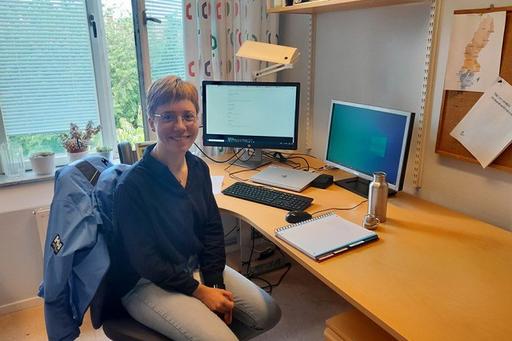Artificial groundwater recharge – A shortcut for harmful poly- and perfluoroalkyl substances (PFASs) into groundwater systems and drinking water supplies – Can we avoid this?
Short description
Emerging contaminants in aquatic systems are of increasing concern and of relevance to the Swedish Environmental Protection Agency, which aims to provide clean drinking water and a non-toxic environment. Poly- and perfluoroalkyl substances (PFASs) are a group of about 5000 persistent contaminants found in a variety of products, that cause severe long-term health effects at daily intake rates in the ng/L range. This project aims at understanding the input of PFASs into groundwater systems and drinking water supplies as well as at improving the attenuation capacity for PFASs during managed aquifer recharge (MAR).
News
June 10th-13th 2025
Groundwater Quality 2025 conference in Bordeaux, France
Philipp Wanner, Tabea Mumberg, and Swagatam Chakraborty attended the Groundwater Quality 2025 conference in Bordeaux, France. Swagatam Chakraborty got to show a poster on microplastic transport in agricultural soils, while Tabea Mumberg presented results of PFAS transport through Managed Aquifer Recharge systems. A great conference!

May 12th-15th 2025
35th SETAC Europe Annual Meeting in Vienna, Austria
Tabea Mumberg showed the results of a literature review on contaminants of emerging concern in Managed Aquifer Recharge systems at the 35th SETAC Europe Annual Meeting in Vienna, Austria. You can read the study here: Managed aquifer recharge as a potential pathway of contaminants of emerging concern into groundwater systems – A systematic review - ScienceDirect
April 28th – May 2nd 2025
12th International Symposium on Managed Aquifer Recharge in Stellenbosch, South Africa
Tabea Mumberg presented first results of tracing PFAS in Managed Aquifer Recharge systems at the 12th International Symposium on Managed Aquifer Recharge (ISMAR) in Stellenbosch, South Africa. The conference was very inspiring with a lot of great researchers present and presentations to see!
October 8th 2024
FRAM seminar on PFAS in Swedish drinking waters – challenges and solutions in Gothenburg, Sweden
Philipp Wanner opened the FRAM seminar on PFAS in Swedish drinking waters by showing a Swedish perspective on PFAS in drinking water as well as ongoing research efforts. He was followed by presentations from Yiyi Xu from the School of Public Health and Community Medicine at Sahlgrenska Academy and Jenny Ivarsson from the Swedish Chemicals Agency giving insights into health effects of PFAS and a regulatory perspective.
FRAM is the Centre for Future Chemical Risk Assessment and Management Strategies in Gothenburg and hosting regular seminars on ongoing research themes.
September 30th- October 4th 2024
DIOXIN 2024 – 44th International Symposium on Halogenated Persistent Organic Pollutants (POPs) in Singapore
Tabea Mumberg presented the work on PFAS in managed aquifer recharge (MAR) at DIOXIN 2024 – 44th International Symposium on Halogenated Persistent Organic Pollutants (POPs) in Singapore. It was an inspiring conference with many interesting presentations and posters on halogenated contaminant research and a lot of great scientists present!
September 9th-13th 2024
IAH 2024 – World Groundwater Congress in Davos, Switzerland
Both Ramin Moghadasi and Tabea Mumberg presented their work on PFAS in the environment at the IAH 2024 World Groundwater Congress in Davos Switzerland. The conference was nicely organized with many interesting people and sessions! Ramin Moghadasi and Tabea Mumberg presented during the session “Per- and polyfluoroalkyl substances (PFAS) in groundwater systems – How do they behave and how can we treat them?” moderated by Philipp Wanner on Thursday.

August 26th 2024
Presentation on PFAS at the INFRAS Monday education
Tabea Mumberg gave, together with Lars Brunken from Karolinska Institutet (Stockholm, Sweden), an online presentation for the Swiss company INFRAS during their Monday education. They presented and discussed PFAS, their fate into the environment as well as their risk assessment and regulation with a lot of great questions from the audience. The session was hosted and initiated by Caspar Esche from INFRAS.
February 2024
February 27th-28th 2024, SIDWater meeting at Gothenburg University, Sweden
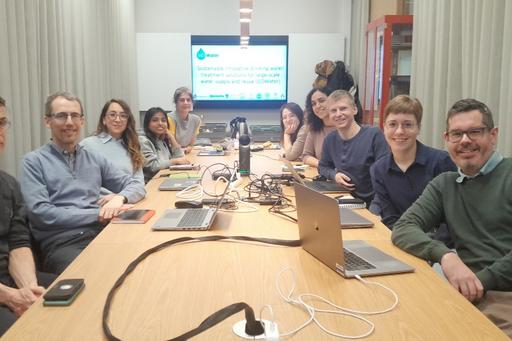
Both Philipp Wanner and Tabea Mumberg participate in a related project called “SIDWater – Sustainable innovative drinking water treatment solutions” lead by the Swedish University of Agricultural Sciences (SLU). This year’s project meeting was hosted at the University of Gothenburg. Participants from SLU, Chalmers University of Technology, Lund University, Uppsala University, Uppsala Vatten och Avfall, Sydvatten, Stockholm Vatten och Avfall, and Norrvatten joined.
This were two great days full of interesting discussion and planning future studies and experiments!
Read more about the SIDWater project on SLU's web page:
SIDWater - Sustainable innovative drinking water treatment solutions | Externwebben (slu.se)
January 2024
January 30th DWF2024 Copenhagen, Denmark
DWF2024 – 18th DWF Water Research Conference was held by the Danish Water Forum (DWF) in Copenhagen, Denmark.
Tabea Mumberg presented her preliminary results from research on using stable water isotope tracing for per- and polyfluoroalkyl substances (PFAS) source tracking throughout an artificially recharged Esker during an interesting session on drinking water.
August 2023
August 30th to September 2nd 2023 - FLUOROS2023 in Idstein, Germany
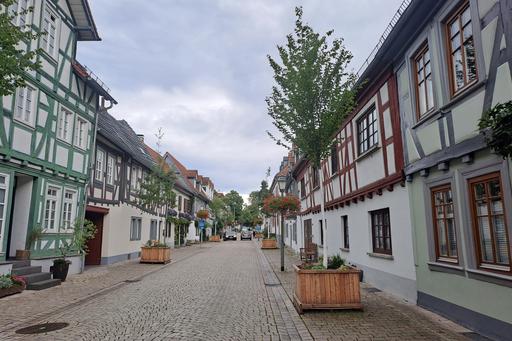
Tabea Mumberg presented her preliminary results from research on PFAS in Managed Aquifer Recharge Systems (MAR) at a poster session during FLUOROS2023 – an international symposium on per- and polyfluoroalkyl substances. After meeting many great people working on PFAS, interesting talks and exciting presentations, Tabea Mumberg will now analyse further PFAS samples at the Swedish University of Agricultural Sciences (SLU).
May 2023
May 31st to June 2nd 2023 - Presentations at the University of Guelph in Canada
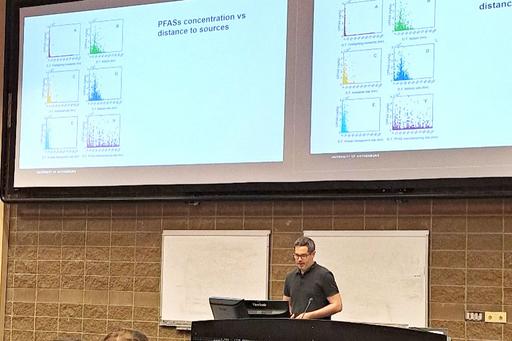
Philipp Wanner and Tabea Mumberg both presented their research on per- and polyfluoroalkyl substances (PFASs) at the University Consortium for Field-Focused Groundwater Research Annual Meeting 2023, hosted by the University of Guelph in Canada. It was great to talk to an international audience and hear very interesting presentations on PFASs and other organic contaminants in groundwater!
April 2023
Half year set of water samples extracted
After visiting SLU for a course on organic micropollutants the past weeks, further water samples from two infiltration sites were again extracted by solid-phase extraction and prepared for analysis of poly- and perfluoroalkyl substances (PFASs) at the Swedish University of Agricultural Sciences (SLU).
PFASs concentration analysis will be conducted by ultra-performance liquid chromatography coupled with tandem mass spectrometry (UPLC-MS/MS) to get an overview of PFASs concentration changes during surface water infiltration. Further water quality parameters already are assessed and will be compared to the measured PFASs concentrations.
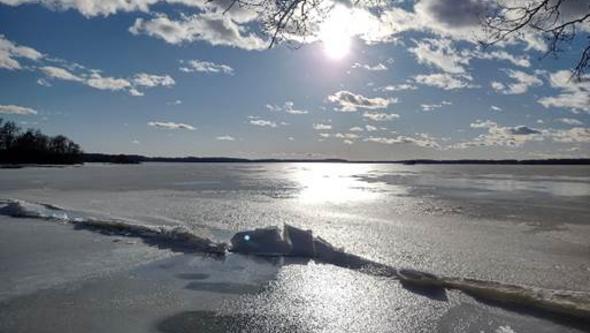
November 2022
Analysis of the first water samples
This week, the first water samples from two infiltration sites were extracted and prepared for analysis of poly- and perfluoroalkyl substances (PFASs) at the Swedish University of Agricultural Sciences (SLU). It will be great to receive the very first data in this project! The PFASs were recovered from the water samples by solid-phase extraction and PFASs concentration analysis will be conducted by ultra-performance liquid chromatography coupled with tandem mass spectrometry (UPLC-MS/MS).
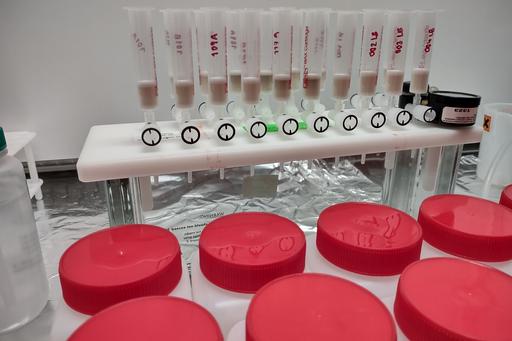
October 2022
Poster presentation at SGU’s Grundvattendagarna 2022
Tabea Meyerjürgens presented her planned PhD project at a poster session during SGU’s Grundvattendagarna 2022 in Gothenburg. It was great to meet many people within groundwater research and discuss the project ideas with them. Additionally, there were several very interesting presentations during the conference.
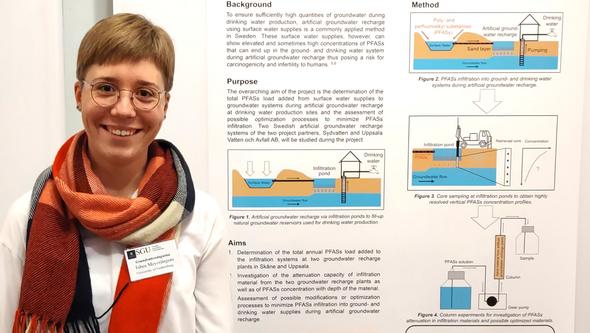
August 24 2022
Kick-off meeting at the Swedish University of Agricultural Sciences (SLU)
Together with our project partners, Britt-Marie Pott from Sydvatten and Philip McCleaf from Uppsala Vatten och Avfall AB (not in the picture), we discussed our new FORMAS project and the next steps working on the investigation of poly- and perfluoroalkyl substances (PFASs) input during managed aquifer recharge (MAR). It was really inspiring to talk to so many skilled people and we are looking forward to collaborating!
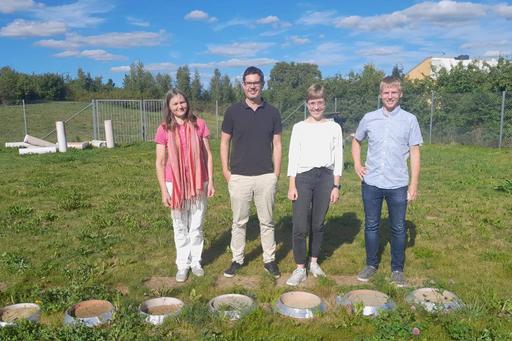
July 2022
New PhD student starting in the contaminant hydrogeology group
Tabea Meyerjürgens started as a new PhD student as part of the project looking at the input of poly- and perfluoroalkyl substances (PFASs) to groundwater systems and drinking water supplies during managed aquifer recharge (MAR) and possible prevention strategies. She will be supervised by Philipp Wanner (University of Gothenburg) and Lutz Ahrens (Swedish University of Agricultural Sciences).
